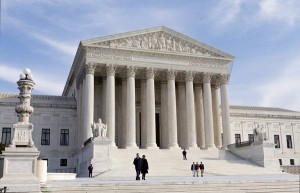The Supreme Court may have ruled the individual mandate of the Patient Protection and Affordable Care Act constitutional, but legal challenges to the federal health care law have only just begun.
The case taken by the Supreme Court, NFIB v. Sebelius, contained a broad challenge to the law’s constitutionality, including challenges to the individual mandate and the Medicaid expansion created by the law. Future lawsuits will focus on specific parts of the law which may violate other constitutional rights. Though these lawsuits are more defined in nature, these challenges could still put the future of the federal health care law at risk.
The Case Against IPAB
One lawsuit, being pursued by the Goldwater Institute, is against the law’s Independent Payment Advisory Board (IPAB). IPAB is a board of 15 presidential appointees that has the authority to control Medicare spending through a variety of means such as determining physician reimbursement rates, dictating how states use federal Medicare dollars, appropriating money, imposing taxes, and determining what drugs, procedures, and tests are judged cost-effective.
Christina Sandefur, Attorney of the Scharf-Norton Center for Constitutional Litigation at the Goldwater Institute, is arguing that this board violates the constitution in two distinct ways.
First, the federal health care law prohibits IPAB from being repealed. Elected officials have only a small frame of time in 2017 to pursue repeal according to the text of the law, and they must attain a 3/5ths supermajority vote from all members of both houses of Congress.
According to Sandefur, “This ‘anti-repeal’ provision rises to the level of unconstitutional entrenchment. By preventing IPAB’s repeal, PPACA binds the hands of future Congresses, denying them their constitutional legislative powers.”
Violating Separation of Powers
The second constitutional violation, Sandefur says, is that IPAB violates the separation-of-powers doctrine.
“PPACA has delegated an unprecedented amount of legislative power to set Medicare policy to 15 unelected, unaccountable bureaucrats. IPAB’s so-called ‘proposals’ automatically become law, and its actions are not subject to judicial review. Thus, IPAB is ‘independent’ in the worst sense of the word: it is independent from administrative, legislative, and judicial review,” Sandefur said.
Whether the courts will accept these arguments remains to be seen, and as Sandefur points out, “The Supreme Court has not found a law to be an unconstitutional delegation of legislative power since the 1930s.” Still, she remains confident courts will see IPAB’s unconstitutionality as clearly as she does.
“Congress has given to IPAB’s unaccountable bureaucrats an unprecedented amount of power, with no guiding principles to constrain it. There has never been a government agency that more clearly violates the Constitution’s separation-of-powers doctrine.”
Contraceptive Mandate Lawsuit
Another lawsuit being pursued against the federal health care law focuses on the administration’s contraceptive mandate. This mandate requires employers to provide access to insurance coverage of preventative services at no direct cost to employees. HHS has decided these services must include abortifacients, sterilization, and contraceptives.
Forty-three religious institutions have filed suit against the mandate, and the state of Michigan was the first state to file suit against HHS, according to Hannah Smith, senior counsel at the Becket Fund for Religious Liberty, one of the plaintiffs.
“Under the First Amendment, we argue that the mandate imposes a substantial burden on the free exercise of our clients through stiff financial penalties if they don’t comply, which is a violation of the Free Exercise Clause,” Smith said. “We also argue that the mandate compels our clients to provide counseling and education on subjects that violate their religious beliefs in violation of the Free Speech Clause. And under the Religious Freedom Restoration Act, the mandate also violates federal law because it places a substantial burden on our clients’ religious exercise without a compelling government interest that is narrowly tailored to meet that interest.
“We fully expect that we will succeed in demonstrating to the courts that this mandate violates guarantees for religious freedom that have been enshrined in our legal tradition since our country’s founding,” Smith said.
Limiting Physician-Owned Hospitals
Another lawsuit filed against HHS involves the federal health care law’s limitations on physician-owned hospitals.
Section 6001 of PPACA restricts physician-owned hospitals from growing or building new hospitals. According to Dr. Michael Russell, president of Physician Hospital of America, this is unconstitutional in two ways.
First, he says, it is unconstitutional on the grounds of retroactivity. “The prohibition on physician-owned facility expansion is unfairly retroactive and impacts hundreds of physician-owned hospital expansion projects,” he said.
Second, Russell says, it is unconstitutional because it “deprives PHA-member hospitals of property without just compensation,” by unrealistically requiring hospitals to finish construction within eight months.
“All we have been requesting is for the right to compete—to complete our hospitals under construction, to finish our expansion projects, and to expand a model of ownership that the government’s own data proves delivers the highest quality of health care to the patients we serve,” Russell said.
Potential Exchange Lawsuit
One additional potential lawsuit against PPACA could challenge the required health insurance exchanges. The law mandates each state to implement its own health insurance exchange, but should states choose not to, the federal government will implement an exchange in its place.
However, according to Jonathan Adler of Case Western Reserve University School of Law and Michael Cannon, director of health care policy studies at the Cato Institute, the law does not authorize the federal government with the ability to grant subsidies through the federal exchanges.
A forthcoming lawsuit could challenge on this basis if the administration attempts to deliver these subsidies despite the letter of the law.





